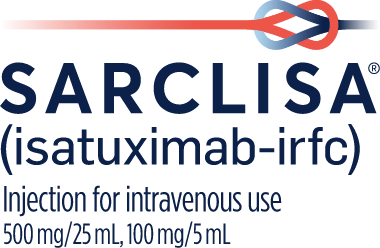POSSIBLE SIDE EFFECTS
Possible side effects of SARCLISA
Infusion reactions
SARCLISA is given by a healthcare provider as an intravenous (IV) infusion into your vein.
Medicines given by IV infusion can sometimes cause unwanted reactions.
Infusion reactions are common with SARCLISA and can sometimes be severe or life threatening.
Your healthcare provider will prescribe medicines before each infusion of SARCLISA to help decrease your risk for infusion reactions or to help make any infusion reaction less severe. You will be monitored for infusion reactions during each infusion of SARCLISA.
Your healthcare provider may slow down or stop your infusion, or completely stop treatment with SARCLISA if you have an infusion reaction.
Get medical help right away if you develop any of the following symptoms of infusion reaction during or after an infusion of SARCLISA:
- shortness of breath, wheezing, or trouble breathing
- swelling of the face, mouth, throat, or tongue
- throat tightness
- palpitations
- dizziness, lightheadedness, or fainting
- headache
- cough
- rash or itching
- nausea
- runny or stuffy nose
- chills
Infections
SARCLISA can cause infections that are severe, life-threatening, or that may lead to death. Your healthcare provider will monitor you for signs and symptoms of infection before and during treatment with SARCLISA. Your healthcare provider may prescribe medicines for you to help prevent infections and treat you as needed if you develop an infection during treatment with SARCLISA. Tell your healthcare provider right away if you develop a fever or any signs or symptoms of infection during treatment with SARCLISA.
Decreased white blood cell counts
Decreased white blood cell counts are common with SARCLISA and certain white blood cells can be severely decreased. Fever can occur with low white blood cell counts and may be a sign that you have an infection.
Your healthcare provider will check your blood cell counts during treatment with SARCLISA and may prescribe a medicine to help increase your white blood cell counts.
Tell your healthcare provider right away if you develop any fever or symptoms of infection during treatment with SARCLISA.
Risk of new cancers
New cancers have happened in people during and after treatment with SARCLISA. Your healthcare provider will monitor you for new cancers during treatment with SARCLISA.
Change in blood tests
SARCLISA may affect the results of blood tests to match your blood type for about 6 months after your last infusion of SARCLISA. Your healthcare provider will do blood tests to match your blood type before you start treatment with SARCLISA. Tell all of your healthcare providers that you are being treated with SARCLISA before receiving blood transfusions.
Common side effects that may occur with SARCLISA in combination with Pomalyst® and dexamethasone
- upper respiratory tract infection
- lung infection (pneumonia)
- diarrhea
- decreased red blood cell count (anemia)
- decreased platelet count (thrombocytopenia)
Common side effects that may occur with SARCLISA in combination with Kyprolis® and dexamethasone
- upper respiratory tract infection
- tiredness and weakness
- high blood pressure
- diarrhea
- lung infection (pneumonia)
- trouble breathing
- trouble sleeping
- bronchitis
- cough
- back pain
- decreased red blood cell count (anemia)
- decreased platelet count (thrombocytopenia)
Common side effects that may occur with SARCLISA in combination with Velcade®, Revlimid®, and dexamethasone
- upper respiratory tract infection
- diarrhea
- tiredness and weakness
- tingling or numbness of the arms or legs
- lung infection (pneumonia)
- muscle or bone pain
- clouding of your eye (cataract)
- constipation
- swelling of the hands, legs, ankles and feet
- rash
- trouble sleeping
- COVID-19
- decreased red blood cell count (anemia)
- decreased platelet count (thrombocytopenia)
Heart failure
Heart failure can happen during treatment with SARCLISA in combination with carfilzomib and dexamethasone. Tell your healthcare provider right away if you develop any of the following symptoms:
- trouble breathing
- cough
- swelling of your ankles, feet, or legs
These are not all the possible side effects of SARCLISA. For more information, ask your healthcare provider or pharmacist.
SARCLISA is a targeted
immunotherapy that works
together with your immune system.


